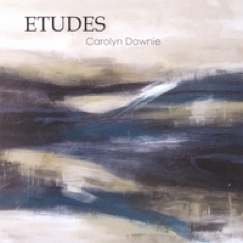
Etudes
Carolyn Downie
2006 / Carolyn Downie
43 minutes
Review by Kathy Parsons
Etudes is a collection of ten original piano solos composed and performed by Carolyn Downie and one flute solo performed by Lynnette Benner. Edgy and experimental, Downie’s work is a combination of composed and improvised music. She recently wrote to me: “I've always asked myself why ‘recreate’ when I can ‘create’? In all artistic endeavors, I aim to create something knowledgeable, personal and new with the more I learn from harmony, theory and other studies and inspirations. I do not use others' methodology, musical trends or scholastic dogma.” Most of the music is on the quiet, pensive side, and while the sonorities are sometimes a bit discordant, they are never harsh or jarring. I have found this CD to be very interesting and enjoyable to listen to.
“Etude in A minor” opens and closes the CD with somewhat differing approaches. The opening version is a bit more percussive, and the reprise is more improvised, blending jazz elements into the original composition. “Prose” was originally composed for harp, and the final passage is played directly on the strings of the piano. Minimal and on the dark side, this piece is quite moody and elegant. “Austa” correlates with the album cover painting, “Daybreak” by Jane McKay. A sparse and repetitive bass figure sets a tone of stillness and quiet while the sparkling treble suggests the dawning of a new day, becoming bigger and brighter as the piece evolves. “Temsta” (Lithuanian for “nightfall”) is one of my favorites. Sometimes tonal and sometimes not, the gentle flow of the left hand creates such a feeling of peace and contentment. The third movement of Etude in C is the flute solo, and explores natural harmonics, pitch bending, and other special techniques for the flute. Dark, spare, and mysterious, this is a fascinating work. “Kumoijoshi” is an experimental study of the basic aesthetic elements of Japanese classical music. The opening passages remind me of the simple beauty of a Japanese brush painting. As strummed chords are added, the music becomes more intense, but the openness of the piece and the Japanese melodic mode (the title of the piece) maintain a sense of calm - an intriguing study.
Obviously, Etudes is far from ear candy, and is geared for a more discerning listener. If you enjoy intelligent, experimental solo piano, this would be an excellent addition to your collection. I look forward to hearing more from this young, upcoming artist. Etudes is available from cdbaby.com.
July 3, 2006

